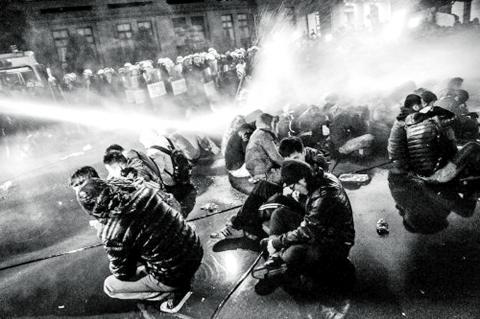Six months after the 24-day occupation of Legislative Yuan, Sunflower participants and supporters will return to the scene tonight — not to protest, but to watch Sunflower Occupation (太陽.不遠), a compilation of nine short documentaries that explore the multiple aspects of the movement and the various issues it raises.
Shortly after the students and activists occupied the legislative floor on March 18, the Taipei Documentary Filmmakers’ Union (台北市紀錄片從業人員職業工會) initiated the collective project and called on filmmakers to join. Eventually, 10 directors, 26 cinematographers and dozens of animators, editors, musicians and volunteers answered the call to create the standalone shorts, funded by 3,154 individual sponsors on VDemocracy.com, a crowdfunding platform for social movements.
Each work tackles a specific theme or issue. The Night of Enlightenment (一夜之間我長大), for example, brings viewers back to the night when the violent crackdown on students occupying the Executive Yuan left many wounded, disenchanted and politically enlightened. Student leader Chen Wei-ting (陳為廷) takes center stage in A Commander Made by Accident (不小心變成總指揮), which offers an honest portrait of Chen’s transformation as an activist. History is revisited in 1990 (我們的1990), revealing how Taiwan has gone through the Wild Lilies (野百合學運) student movement in 1991 to the Sunflowers, as seen through the eyes of former Wild Lilies.

Photo courtesy of Activator Marketing Company
Tonight’s event will take place on Jinan Road (濟南路) outside the legislature. The outdoor screening will start at 7pm, followed by a brief talk by two participating filmmakers He Chao-ti (賀照緹) and Tsai Tsung-lung (蔡崇隆).
After tonight’s screening, the film will tour to 17 cities and towns across the country from tomorrow to Nov. 16. All screenings are free. Those interested need to sign up through www.accupass.com, where screening schedules and venue information are available.
More information about the project can be found on its Facebook fan page at www.facebook.com/318doc.

Jacques Poissant’s suffering stopped the day he asked his daughter if it would be “cowardly to ask to be helped to die.” The retired Canadian insurance adviser was 93, and “was wasting away” after a long battle with prostate cancer. “He no longer had any zest for life,” Josee Poissant said. Last year her mother made the same choice at 96 when she realized she would not be getting out of hospital. She died surrounded by her children and their partners listening to the music she loved. “She was at peace. She sang until she went to sleep.” Josee Poissant remembers it as a beautiful

For many centuries from the medieval to the early modern era, the island port of Hirado on the northwestern tip of Kyushu in Japan was the epicenter of piracy in East Asia. From bases in Hirado the notorious wokou (倭寇) terrorized Korea and China. They raided coastal towns, carrying off people into slavery and looting everything from grain to porcelain to bells in Buddhist temples. Kyushu itself operated a thriving trade with China in sulfur, a necessary ingredient of the gunpowder that powered militaries from Europe to Japan. Over time Hirado developed into a full service stop for pirates. Booty could

Before the last section of the round-the-island railway was electrified, one old blue train still chugged back and forth between Pingtung County’s Fangliao (枋寮) and Taitung (台東) stations once a day. It was so slow, was so hot (it had no air conditioning) and covered such a short distance, that the low fare still failed to attract many riders. This relic of the past was finally retired when the South Link Line was fully electrified on Dec. 23, 2020. A wave of nostalgia surrounded the termination of the Ordinary Train service, as these train carriages had been in use for decades

Lori Sepich smoked for years and sometimes skipped taking her blood pressure medicine. But she never thought she’d have a heart attack. The possibility “just wasn’t registering with me,” said the 64-year-old from Memphis, Tennessee, who suffered two of them 13 years apart. She’s far from alone. More than 60 million women in the US live with cardiovascular disease, which includes heart disease as well as stroke, heart failure and atrial fibrillation. And despite the myth that heart attacks mostly strike men, women are vulnerable too. Overall in the US, 1 in 5 women dies of cardiovascular disease each year, 37,000 of them